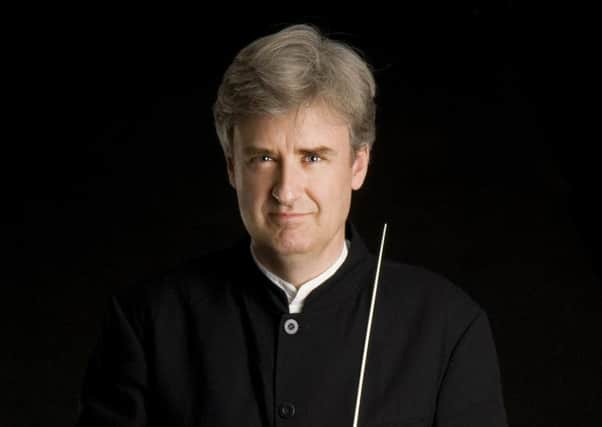Great Dane Thomas Dausgaard set to orchestrate BBC SSO's 2016-17 season


At the heart of the BBC SSO’s 2016-17 season, announced earlier this week, is Danish conductor Thomas Dausgaard. The 52-year old Dane was formerly principal conductor of the Swedish and Danish Symphony Orchestras, and is currently principal guest conductor of the Seattle Symphony, where critics have marked out his performances of Sibelius and Mahler.
He marks his inaugural season as the SSO’s new chief conductor with a major presence of nine programmes and a spirit of bold adventure.
Advertisement
Hide AdAdvertisement
Hide AdIt’s all about “stimulating curiosity”, he says. Too true. This is a seasonal package amply filled with new commissions, composer names that don’t instantly roll off the tongue, a bold and unorthodox Beethoven experiment, a big Bruckner first, and so much more.
Equally, we’re all curious to see how Dausgaard’s relationship with the SSO will develop. He’s a very different animal to his predecessor Donald Runnicles, whose association continues as conductor laureate and a single appearance next season in Mozart and Mahler 4.
As always, the SSO’s spinal column is its Thursday series in Glasgow, some 20 concerts ranging in style from Haydn and Mozart, to Mahler and Wagner, to new works where the ink is hardly dry on the page. Add to that the continued fascination of the Saturday Hear and Now concerts – the most sustained package of contemporary orchestral music in Scotland – and the traditional mini series in Aberdeen, Edinburgh, Perth and Inverness.
September’s Glasgow season openers are an uncompromising challenge: a gauntlet tossed down by Dausgaard, no doubt to assert and establish his persona. It takes guts to set the ball rolling with a new commission – Helen Grimes’ Caterline in Winter, which is the first of several works appearing during the season under the theme Scottish Inspirations. The rest – performed in December – are a partner work by Grime, a new piano concerto by Sally Beamish and the orchestral work Fèin-Aithne by the highly promising young New Cumnock composer Jay Capperauld.
But the opening Glasgow concert is a cracker, in which Grimes’ piece is partnered by the same version of Bruckner’s unfinished Symphony No 9 as that recorded by Simon Rattle and the Berlin Philharmonic. Dausgaard will conduct its first Scottish performance.
The following week is a Beethoven marathon – a recreation of the so-called 1808 Academy Concert which Beethoven organised at the Theater an der Wien, which lasted many hours, and was reportedly – due to bad organisation and lack of heating – a disaster. Will it work in the comfort of the City Halls? Comprising a piano concerto, the Choral Fantasia, movements from the Mass in C, sundry solo arias and piano works, and the young Jan Lisiecki on piano, it’s certainly worth a try.
Other highlights under Dausgaard include Britten’s Violin Concerto with soloist Daniel Hope, Dvorak’s Cello Concerto with the effervescent Steven Isserlis, the late-Romantic modernism of Danish composer Rued Langgaard, and to conclude the season, Haydn’s The Creation and Mahler’s Symphony No 7.
Advertisement
Hide AdAdvertisement
Hide AdAmong the programming themes are all three of Elgar’s symphonies (including Anthony Payne’s fascinating “elaboration and completion” of the unfinished Third) conducted respectively by Dausgaard, Richard Farnes and John Wilson, a Geordie better known for his classic film score restorations and the orchestra that bears his name.
Martyn Brabbins tackles Sir Michael Tippett’s first two symphonies – the other two to follow in 2017-18 – which is a welcome opportunity to hear a composer whose music has fallen out of fashion since his death in 1998. James MacMillan returns to conduct his own Symphony No 4, which Runnicles and the SSO premiered at the 2015 BBC Proms. Principal guest conductor Ilan Volkov combines the eccentricities of Busoni and Weill in a programme that includes the latter’s biting collaboration with Berthold Brecht, The Seven Deadly Sins.
There’s no shortage of fine soloists, from soprano Carolyn Sampson in Mahler 4 and pianist Jean-Efflam Bavouzet in Ravel’s two piano concertos, to soprano Erin Wall in Strauss’ Four Last Songs and Martin Roscoe in Beamish’s new piano concerto.
For Edinburgh audiences, there are four programmes at the Usher Hall: the opening Bruckner 9 concert, though with a Mozart piano concerto, played by Imogen Cooper, replacing Grime’s new work; Runnicles’ Mozart-Mahler concert; a Rachmaninov Second Piano Concerto with soloist Yevgeny Subdin; and Dausgaard’s Mahler 7.
Ultimately, it’s a season in which all eyes will be on the SSO’s new conductor. It’s too soon to say how dynamic the relationship will be. These things can take time.
• Full details of the BBC SSO 2016-17 season at www.bbc.co.uk/bbcsso